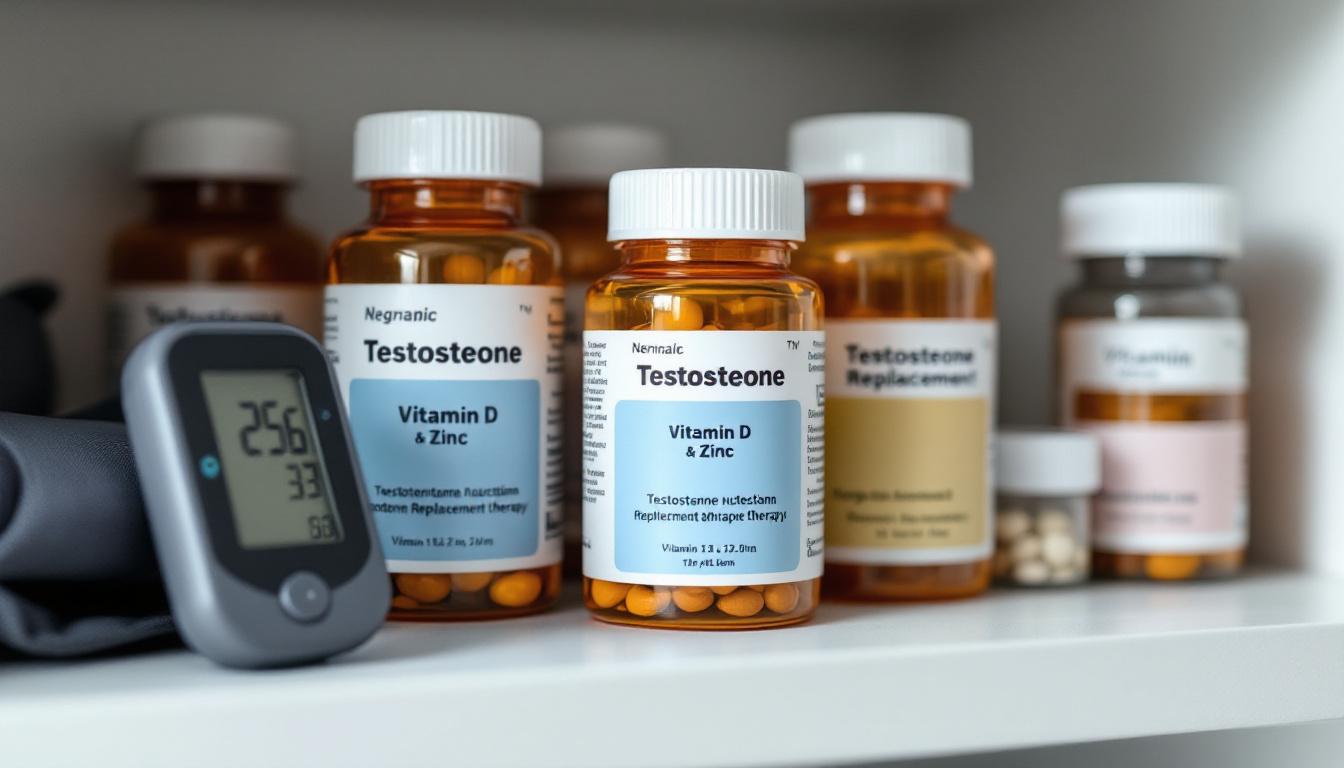Testosterone plays a vital role in men’s health, influencing everything from muscle mass to mood. However, as men age, their testosterone levels naturally decline, leading to various health issues.
At SaltMD, we’ve seen firsthand how testosterone replacement therapy can transform lives. The benefits of testosterone replacement therapy in men are numerous and can significantly improve overall well-being and quality of life.
What Is Testosterone and Why Does It Matter?
Testosterone, the primary male sex hormone, plays a pivotal role in men’s health beyond sexual function. This androgen influences muscle development, bone density, fat distribution, and cognitive function.
The Testosterone Balancing Act
In healthy adult males, testosterone levels typically range from 300 to 1,000 nanograms per deciliter (ng/dL). These levels fluctuate throughout the day and are influenced by various factors. Age significantly impacts testosterone production, with levels declining by about 1% per year after age 30 (Journal of Clinical Endocrinology & Metabolism).
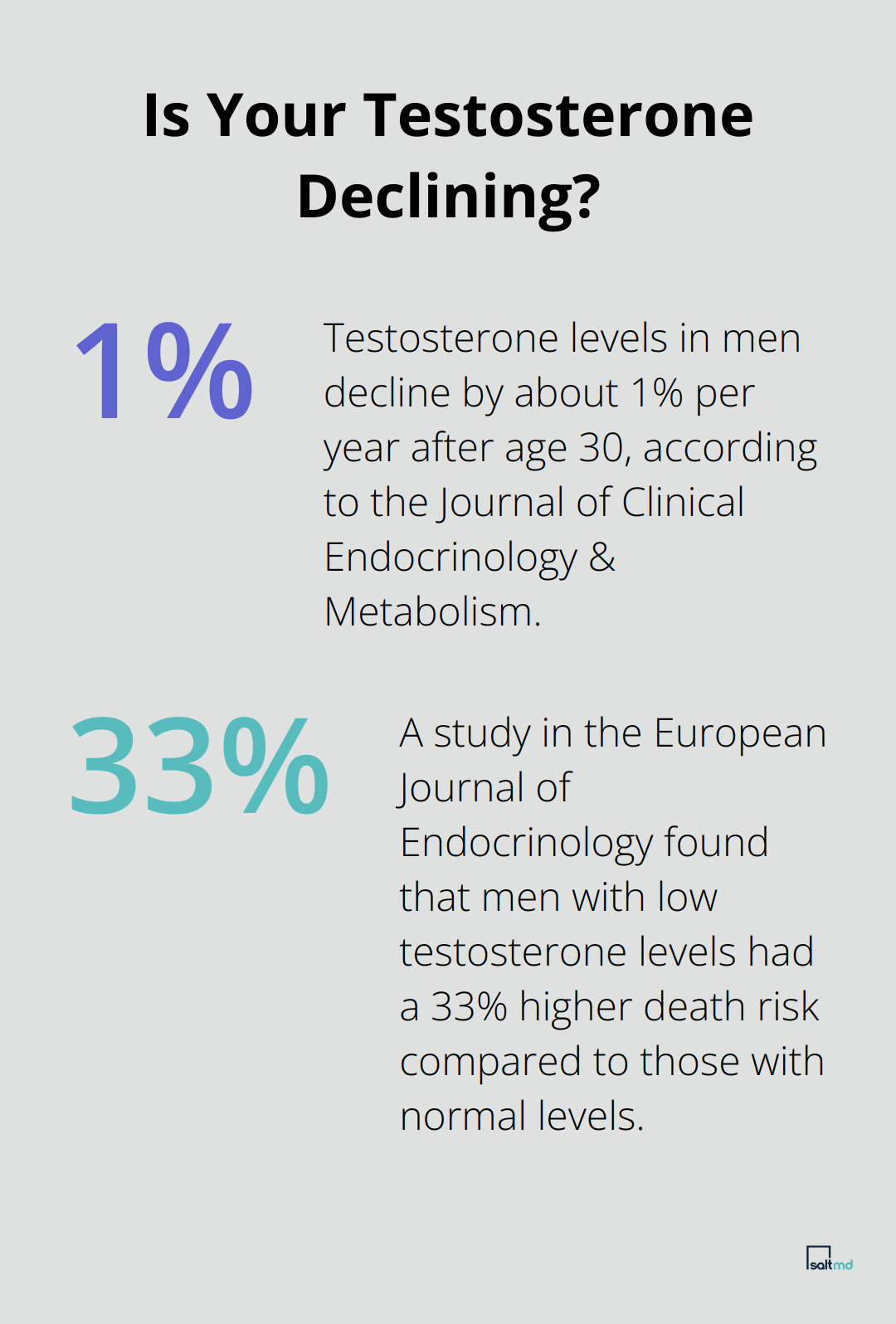
Several factors affect testosterone production:
- Stress: Chronic stress elevates cortisol, suppressing testosterone production.
- Sleep: Poor sleep quality or insufficient duration lowers testosterone levels.
- Diet: A balanced diet rich in zinc, vitamin D, and healthy fats supports optimal testosterone production.
- Exercise: Regular physical activity, especially resistance training, boosts testosterone levels.
- Body composition: Excess body fat (particularly abdominal fat) leads to lower testosterone levels.
Recognizing Low Testosterone
Low testosterone (hypogonadism) manifests in various ways. Common signs and symptoms include:
- Reduced libido and erectile dysfunction
- Decreased muscle mass and strength
- Increased body fat, especially around the midsection
- Fatigue and low energy levels
- Mood changes (irritability and depression)
- Difficulty concentrating and memory issues
- Reduced bone density (increasing osteoporosis risk)
It’s important to note that other health conditions can cause these symptoms. If you experience any of these signs, consult a healthcare professional for proper diagnosis and treatment.
The Impact of Low Testosterone
Low testosterone effects can be far-reaching. A study in the European Journal of Endocrinology found that men with low testosterone levels had a 33% higher death risk compared to those with normal levels. This increased risk primarily associated with cardiovascular disease and cancer.
Moreover, low testosterone significantly impacts quality of life. Many men report feeling less confident, less motivated, and less satisfied with their overall well-being when dealing with low testosterone levels.
The Role of Testosterone Replacement Therapy
Testosterone replacement therapy (TRT) offers a potential solution for men with clinically low testosterone levels. TRT aims to restore testosterone to normal physiological ranges, potentially alleviating symptoms and improving overall health.
While TRT shows promise, it’s not a one-size-fits-all solution. The decision to start TRT should involve a thorough discussion with a healthcare provider (such as those at SaltMD) who can assess individual needs, risks, and potential benefits.
As we explore the benefits of testosterone replacement therapy in the next section, you’ll gain a deeper understanding of how this treatment can potentially transform lives and improve overall well-being.
How Testosterone Replacement Therapy Transforms Men’s Health
Testosterone replacement therapy (TRT) offers a range of benefits that can significantly improve the quality of life for men with low testosterone levels. The impact of TRT extends far beyond just hormone levels, affecting various aspects of physical and mental well-being.
Physical Performance Enhancement
TRT has a profound impact on physical performance. A study published in the New England Journal of Medicine found that men receiving TRT experienced an average increase of 2.7 kg in lean body mass over a 6-month period. This increase in muscle mass translates to greater strength and improved physical function.
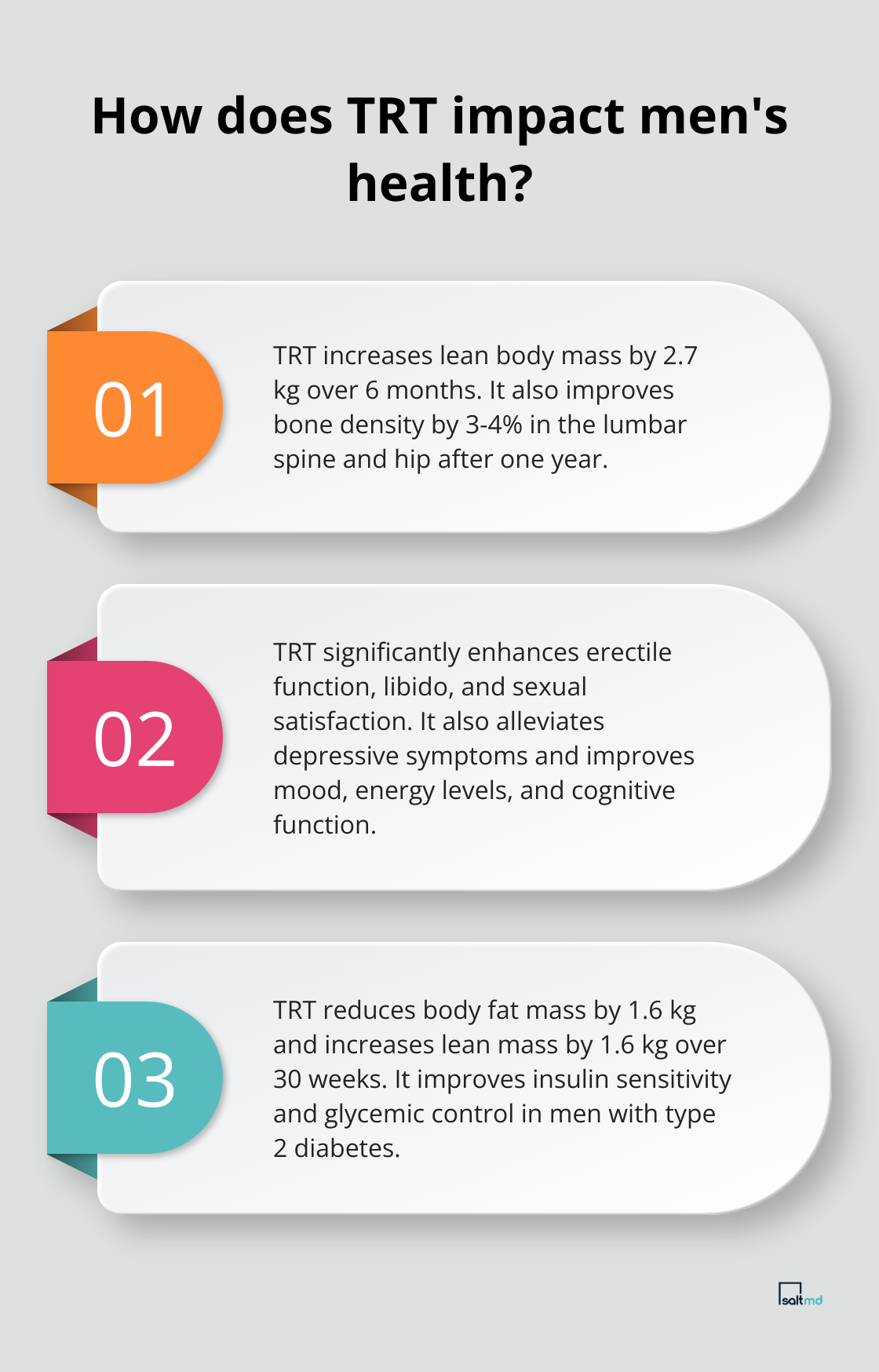
TRT also enhances bone density, which is essential for preventing osteoporosis. Research in the Journal of Clinical Endocrinology & Metabolism showed that men on TRT for one year experienced a 3-4% increase in bone mineral density in the lumbar spine and hip. This improvement can reduce the risk of fractures and maintain mobility as men age.
Sexual Health Restoration
One of the most noticeable benefits of TRT is its effect on sexual function. A meta-analysis in the Journal of Sexual Medicine reported that TRT significantly improved erectile function, libido, and sexual satisfaction in men with low testosterone.
Patients often report a renewed interest in sex and improved performance within weeks of starting treatment. This improvement in sexual health can have a positive ripple effect on relationships and overall well-being. (Many men describe feeling “like themselves again” in this aspect of their lives.)
Mental Clarity and Mood Improvement
TRT doesn’t just benefit the body; it also impacts the mind. A study in the Journal of Psychiatric Practice found that TRT alleviated depressive symptoms in men with low testosterone. Patients frequently report improved mood, increased energy levels, and enhanced cognitive function.
This mental boost can lead to improved work performance, better social interactions, and an overall more positive outlook on life. (The mental clarity that comes with balanced testosterone levels can be life-changing for many men.)
Metabolic Health Optimization
TRT plays a key role in metabolic health. Research published in the European Journal of Endocrinology demonstrated that TRT reduced body fat mass by an average of 1.6 kg and increased lean mass by 1.6 kg over 30 weeks.
Furthermore, TRT has shown to improve insulin sensitivity and reduce the risk of type 2 diabetes. A study in the journal Diabetes Care found that men with type 2 diabetes who received TRT showed improved glycemic control compared to those who didn’t.
While the benefits of TRT are substantial, it’s important to approach this therapy under the guidance of experienced professionals. A thorough assessment determines if TRT is right for you, and personalized treatment plans maximize benefits while minimizing potential risks.
TRT isn’t just about boosting a number on a lab test; it restores vitality, improves health outcomes, and enhances overall quality of life. As we explore the world of hormone optimization, the transformative power of properly administered TRT becomes increasingly evident. The next section will discuss the various types of testosterone replacement therapy available, helping you understand the options for this potentially life-changing treatment.
How to Administer Testosterone Replacement Therapy
Testosterone replacement therapy (TRT) offers various administration methods, each with unique advantages. The choice depends on individual factors like lifestyle, preferences, and medical history. This chapter explores the most common TRT options available today.
Intramuscular Injections: A Reliable Method
Intramuscular injections remain a popular and effective TRT method. Doctors typically administer these injections every 1-2 weeks to maintain consistent testosterone levels. A study in the Journal of Clinical Endocrinology & Metabolism revealed that intramuscular TRT led to significant improvements in sexual function and mood within 3-6 weeks.
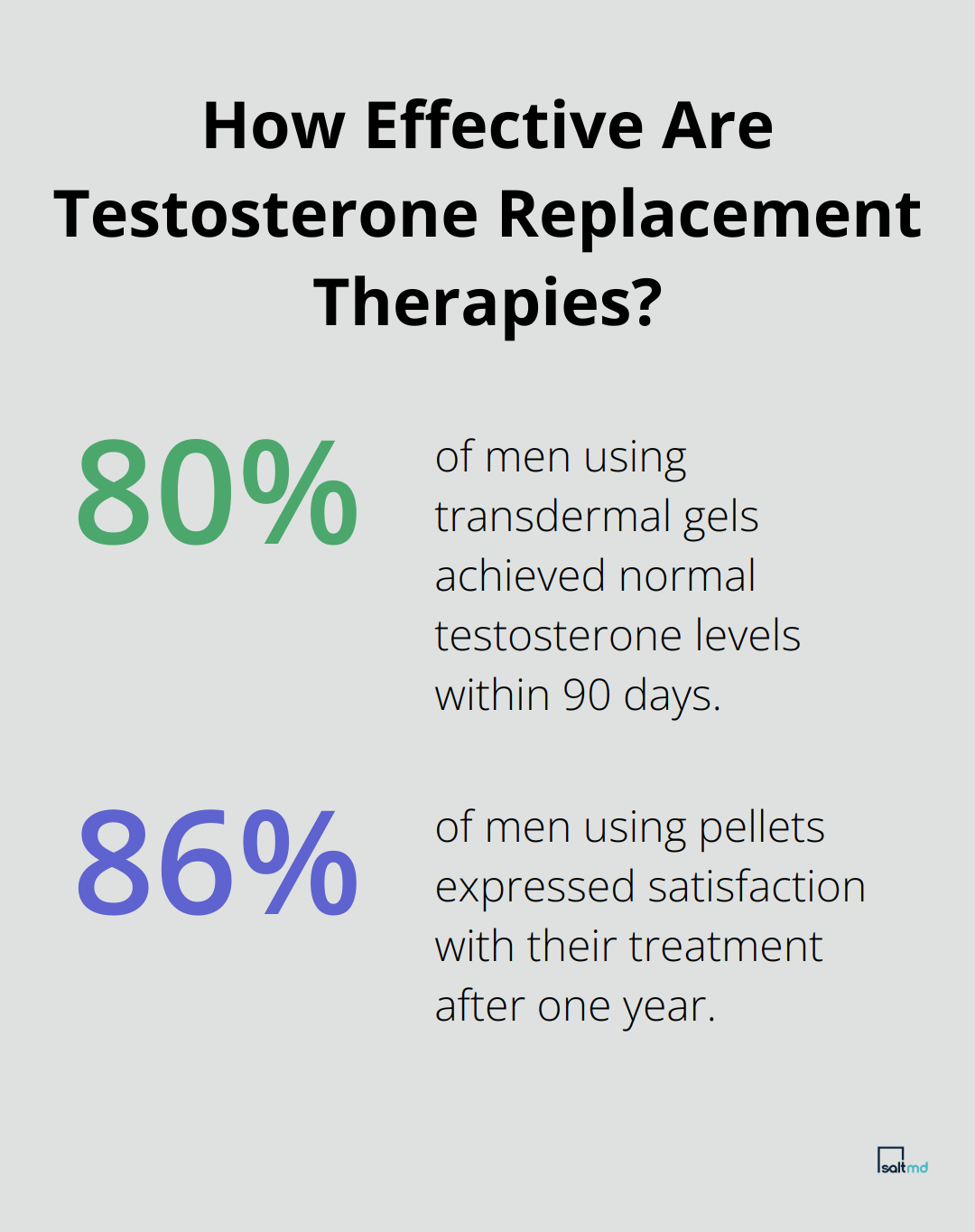
Many patients report a surge of energy and improved mood shortly after injections. However, some experience fluctuations in testosterone levels between doses, which can lead to mood swings or energy dips. To address this, many clinicians now recommend more frequent, smaller doses.
Transdermal Options: Ease of Use
Transdermal patches and gels provide a non-invasive alternative to injections. Users apply these products daily for a steady release of testosterone. A 2018 study in the Journal of Urology showed that 80% of men using transdermal gels achieved normal testosterone levels within 90 days.
Gels have gained popularity due to their ease of use. (However, users must take care to avoid transferring the gel to others through skin contact.) Patches, while equally effective, can cause skin irritation in some users.
Long-Acting Solutions: Pellets and Nasal Gels
Subcutaneous pellets offer a long-term solution with minimal maintenance. Doctors insert these pellets under the skin every 3-6 months, providing a steady testosterone release. A study in the International Journal of Impotence Research reported that 86% of men using pellets expressed satisfaction with their treatment after one year.
Nasal gels, a newer TRT option, offer rapid absorption and mimic the body’s natural testosterone production rhythm. Users apply these gels three times daily. (This method bypasses the liver, potentially reducing the risk of liver-related side effects.)
Oral Medications: An Evolving Option
While oral testosterone medications exist, doctors prescribe them less frequently due to potential liver toxicity concerns. However, newer formulations show promise in ongoing clinical trials.
Choosing the Right Method
Selecting the appropriate TRT method plays a vital role in treatment success. Factors to consider include:
- Lifestyle and convenience
- Absorption rates and effectiveness
- Potential side effects
- Cost and insurance coverage
- Personal comfort with the administration method
Healthcare providers conduct thorough assessments to determine the most suitable option for each individual. The goal is to optimize testosterone levels while minimizing potential side effects, ensuring a balanced approach to hormone therapy.
Final Thoughts
Testosterone replacement therapy offers numerous benefits for men, including increased muscle mass, enhanced libido, and improved mood. These advantages can significantly enhance quality of life for those with low testosterone levels. However, TRT is not a universal solution, and each individual’s needs require personalized care from experienced healthcare professionals.
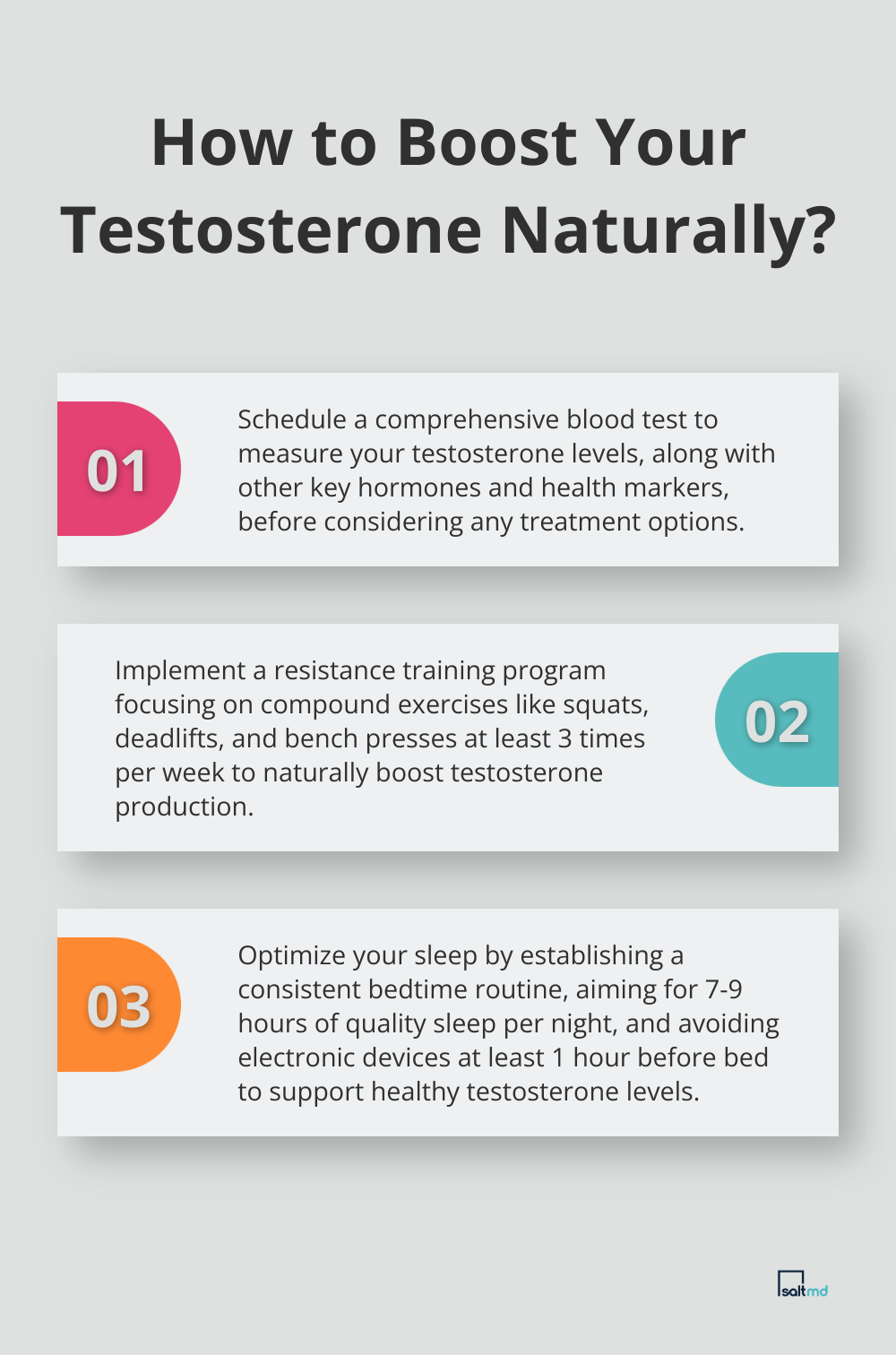
The potential of personalized hormone therapy extends beyond addressing low testosterone, potentially improving cardiovascular health, cognitive function, and metabolic processes. As research in this field progresses, we gain a deeper understanding of how hormone balance influences various aspects of health and longevity. (This knowledge allows for more targeted and effective treatments.)
At SaltMD, we specialize in advanced health optimization services, including personalized hormone therapies. Our evidence-based approach allows us to tailor treatment plans that address individual needs and goals. If you’re experiencing symptoms of low testosterone or want to explore the benefits of hormone therapy, consider reaching out to SaltMD for a comprehensive evaluation.

